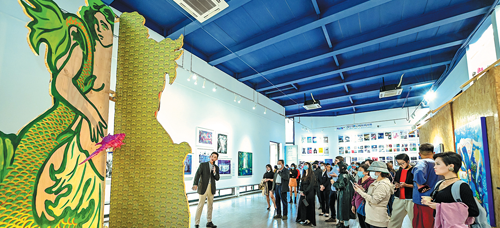

Visitors attend the World Ocean Week in Xiamen, Fujian province. [Photo provided to China Daily]
The city of Xiamen in East China's Fujian province is stepping into the international spotlight by hosting the annual World Ocean Week from Nov 18-24.
Since 2005 when the first session was held, the weeklong event has together attracted nearly 1,000 government officials, experts and scholars from 127 countries and regions, as well as 18 international organizations.
The grand gathering has grown into an important platform for dialogue, exchanges and cooperation in marine issues and actions among China's coastal cities, ocean-related sectors and the international community.
It has also been committed to promoting the healthy development of marine industries and sustainable use of resources, and creating a marine culture festival to enhance public awareness of the ocean's significance.
The theme of this year's event is humans and oceans working together toward a new decade of blue development, which will "allow you to focus on topics such as blue carbon, biodiversity, marine culture and marine ecological protection", said Peter Thomson, the United Nations secretary-general's special envoy for ocean affairs, at the opening ceremony via video link. He also emphasized the centrality of the ocean in ensuring the health of the global ecosystem and the sustainable development of the blue economy that represents the most hopeful, circular, socioeconomic framework for the post-pandemic era.
The content of this year's ocean week is enriched with a series of marine-related activities organized under the framework of several ministries-including the Ministry of Agriculture and Rural Affairs, Ministry of Commerce and Ministry of Education-so as to better integrate their resources and help them gain mutual promotion.
"Ocean plus" activities are one of the highlights of the event. In the field of ocean plus eco-civilization, for example, it is organizing the "ocean super year-2021 global progress in ocean health" conference for the first time.
Thomson, Chen Danhong, deputy director of the Department of International Cooperation of the Ministry of Natural Resources, and Kristian Teleki, director of the Friends of Ocean Action, are to deliver keynote speeches at this.
The conference lists the progress and discussions on oceans being made at this year's global gatherings and explores how to promote and accelerate action.
A blue carbon international summit is also being held at the event for the first time. Blue carbon refers to the processes and mechanisms that use marine activities and organisms to absorb carbon dioxide from the atmosphere and store it in oceans. It now serves as a key strategy to mitigate and adapt to climate change.
More than 10 experts are to share their experiences in managing the blue carbon ecosystem in coastal zones, and work with representatives from home and abroad to explore its potential.
As for cultural carnivals, the event will host a national map knowledge competition to enhance patriotism and national pride among the public. Some 30 players will compete in semifinals and finals, which will be broadcast through the Xiamen Star satellite TV channel.
Some activities are being held online during this year's ocean week.
The 11th Asia-Pacific Economic Cooperation Blue Economy Forum, for example, will explore blue economy practices based on ecological products via video link.
It will also promote strong, balanced, secure, sustainable and inclusive growth in the APEC region, and put forward initiatives on APEC blue economic demonstration and cooperation.
The Xiamen International Boat Show, held from Nov 19-30, is showcasing more than 440 products provided by 200 companies from 15 countries and regions at its online exhibition.
Jimei University will take visitors on a "cloud tour" of the university's natural science museum and display more than 2,600 species in aquatic organisms and 290 species of terrestrial organisms.
They include many unique, rare, endangered and extinct species of China. Also, the university will have a live broadcast on Nov 21 on Douyin, an online short-video platform also known as TikTok, to showcase the colorful world under the sea and popularize biological knowledge.